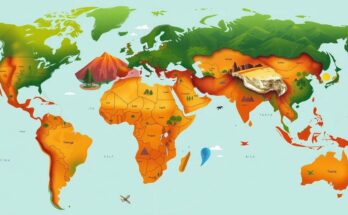This article explores the transformative impact of artificial intelligence (AI) on cultural preservation, emphasizing its role in digitization and enhancing accessibility to cultural heritage. The discussion highlights global applications of AI in museums and cultural institutions, illustrating its potential to revitalize and safeguard historical narratives.
The relationship between artificial intelligence (AI) and cultural preservation is an evolving narrative, where AI serves as a catalyst for innovative solutions to safeguard our shared heritage. As articulated by Joanna Maciejewska, there exists a desire for AI to alleviate mundane tasks, allowing humans to dedicate their energies towards creative pursuits. Despite substantial advancements in various sectors, the cultural domain remains underexplored in the application of AI technologies. AI’s potential to drive digitization efforts can significantly enhance accessibility to cultural assets, utilizing advanced techniques such as laser scanning of delicate manuscripts and generating intricate 3D models of historical edifices. Moreover, AI’s capabilities can assist in reconstructing damaged artifacts and offering comprehensive analyses of historical occurrences, thus reviving dormant fragments of human history. Across the globe, practical implementations of AI in culture are already observable. In Italy, technology has been employed to evaluate and restore the frescoes of Palazzo Vecchio, while the UK utilizes predictive analytics for cultural event attendance forecasting, and Singapore innovatively enhances historical photograph imagery through AI colorization. My travels in the United States provided a glimpse into the remarkable integration of AI within museum experiences, where immersive storytelling techniques and interactive applications significantly enrich visitor engagement. Museums are increasingly adopting virtual and augmented reality frameworks, and some, like the Salvador Dalí Museum, have introduced digital interactions with representations of iconic artists. While Egypt’s cultural laces harness AI’s capabilities to various degrees, the possibilities for deeper integration are vast. The Grand Egyptian Museum’s interactive exhibits and advanced holographic displays of artifacts like King Tut’s mask illustrate the promise awaiting exploration. AI language processing can also revolutionize the translation and accessibility of hieroglyphic texts for a wider audience. It is imperative to perceive AI not as a disruptive force but rather as a revolutionary tool in cultural conservation. As current conversations focus predominantly on Narrow AI, a cautious approach remains prudent, while recognizing the imaginative prospects ahead.
The advent of artificial intelligence presents unprecedented opportunities for cultural preservation and enhancement. AI’s ability to integrate into various realms signifies a historical shift in how we can protect and celebrate our global heritage. With its capabilities, AI can facilitate extensive digitization, serve to deepen the analysis of our past, and provide new methods for accessing cultural narratives. This article explores the transformative potential of AI within the cultural landscape, focusing on practical applications and its implications for the future of heritage preservation.
In conclusion, artificial intelligence represents a transformative tool for the preservation and accessibility of cultural heritage. By harnessing AI’s capabilities, we can revitalize historical narratives, facilitate deeper engagement with artifacts, and navigate the complexities of cultural conservation. The potential applications of AI are far-reaching, emphasizing the importance of utilizing technology as a valuable resource rather than a threat. Careful, innovative implementation will aid in safeguarding the richness of our cultural legacies for generations to come.
Original Source: www.dailynewsegypt.com




